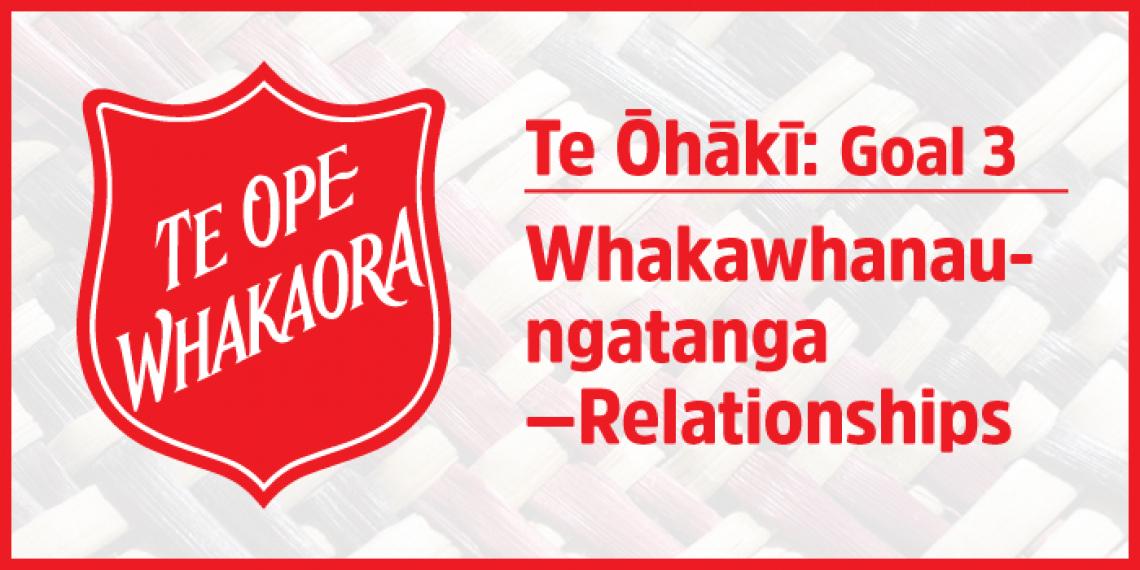You are here
Te Ōhākī: Whakawhanaungatanga —Relationships

Goal 3: Whakawhanaungatanga – Relationships
‘Our operational models foster and implement a culture of whanaungatanga to better develop an environment that is welcoming and inclusive for Māori and all people.’
Modern-day life can sometimes be isolating and individualistic. However, when we stop and think we realise just how connected we are to many other people and places.
It is the importance of these connections that is at the heart of the third goal in the Māori Ministry Strategic Plan 2015–2025. The Māori value of whakawhanaungatanga (creating connectedness and relationship) recognises that a person’s identity comes from their connection with other people and places, rather than from what they do as individuals. We are so much more than isolated individuals. We come from whānau —family, and our family heralds from a place or many places.
The value of whakawhanaungatanga has many aspects, including whakapapa (genealogy), manaakitanga (hospitality and caring), and karaititanga (unity through Christ).
Whakapapa—Genealogy (being connected with our own family and cultural history). See Matthew 1:1–17.
Whakapapa (genealogy) is an important way of remembering where we come from, and recognising and acknowledging our genealogical connections with others. People who understand their ancestral backstory and history have a clearer understanding of who they are. Through whakapapa, Māori can authentically build connections with one another.
We see this same value in biblical genealogies. It was important that Jesus was located within a story, in a real family with an authentic history.
To practice whakawhanaungatanga, we will therefore honour and value where people come from, including their family connections and wider culture. More specifically, for Māori within and engaging with Te Ope Whakaora—The Salvation Army—we will honour their whakapapa, and support them to grow in their cultural identity as Māori.
Manaakitanga–Hospitality (Building connections and providing hospitality to others)
Kia mau tonu te aroha ki ngā teina. Kei wareware ki te atawhai manuhiri: nā tēnei hoki i whakamanuhiri anahera ai ētahi, kīhai anō i matau atu. Keep on loving one another as brothers and sisters. Do not forget to show hospitality to strangers, for by so doing some people have shown hospitality to angels without knowing it. (Hebrews 13:1–2)
‘Mana’ refers to an individual’s spiritual dignity, ‘aki’ means to encourage or spur on; therefore ‘manaaki’ means to encourage the dignity and worth of others. As we honour and spur on others, we also increase our own mana. Manaakitanga is ultimately the goal of Christian hospitality.
An important aspect of manaaki is the pōwhiri, where visitors are welcomed, connections are built, and strangers become friends. To practice whakawhanaungatanga, we will therefore nurture environments that are welcoming, that honour and esteem others—especially those who might be different to ourselves. More specifically for Māori, we will ensure that our practices are culturally appropriate and welcoming for Māori within Te Ope Whakaora.
Karaititanga—Unity in Christ (Recognising our spiritual connections as ‘te whānau a te Karaiti—the family of Christ’). See 1 Corinthians 12:12.
In Christ, there is unity regardless of our cultural background. We are whānau—brothers and sisters in Christ. Sometimes modern Western life, including the expression of faith, can be individualistic and potentially isolating, particularly for people from more communal cultures. There can be a perceived pressure for people to distance themselves from their culture and family of origin, but at the same time, church might not build the appropriate and secure sense of community they are needing.
To practice whakawhanaungatanga we will therefore encourage a strong sense of unity, belonging and spiritual connectedness for all people, while honouring each person’s unique culture and identity. More specifically for Māori, we will allow Māori disciples to explore and discover their unique identity as Māori Christians.
Ideas for developing whakawhanaungatanga
- encourage Māori where possible to know and nurture their authentic whānau/iwi connections
- help Māori Salvationists to connect their Māori and Christian heritage and identity
- equip and encourage Māori Salvationists to be salt and light within their whānau/hapū
- support avenues for Māori to reach out and build connections with one another across The Salvation Army
- support Māori to express their identity as Māori Christians within The Salvation Army
- encourage non Māori to understand and connect with their own culture and family, and recognise the value and authenticity of each person’s cultural history and story
- encourage Pākehā and other cultures to actively reach out to engage with and learn about Māori culture even when this might be uncomfortable —as we make a sincere effort, we discover ourselves embraced within a culture of manaaki and aroha
- learn about and incorporate principles of manaakitanga and pōwhiri in our own practices.
By Captain Tim Malton
- Read the Māori Ministry Strategic Plan